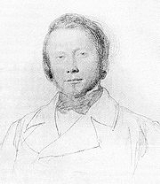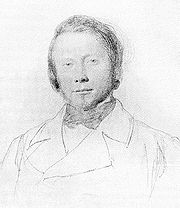
Johannes Verhulst
Encyclopedia

The Hague
The Hague is the capital city of the province of South Holland in the Netherlands. With a population of 500,000 inhabitants , it is the third largest city of the Netherlands, after Amsterdam and Rotterdam...
, March 19, 1816 – Bloemendaal
Bloemendaal
Bloemendaal is a municipality and a town in the Netherlands, in the province of North Holland. According to the Dutch Central Statistical Bureau, Bloemendaal is the wealthiest place in the Netherlands.-Population centres :...
, January 17, 1891) was a Dutch
Netherlands
The Netherlands is a constituent country of the Kingdom of the Netherlands, located mainly in North-West Europe and with several islands in the Caribbean. Mainland Netherlands borders the North Sea to the north and west, Belgium to the south, and Germany to the east, and shares maritime borders...
composer
Composer
A composer is a person who creates music, either by musical notation or oral tradition, for interpretation and performance, or through direct manipulation of sonic material through electronic media...
and conductor
Conducting
Conducting is the art of directing a musical performance by way of visible gestures. The primary duties of the conductor are to unify performers, set the tempo, execute clear preparations and beats, and to listen critically and shape the sound of the ensemble...
. As a composer mainly of songs and as administrator of Dutch musical life, his influence during his lifetime was considerable.
Life
As a boy, Verhulst sang in a catholic choir; here he distinguished himself by his gift for music. In his teens, he succeeded in becoming a first violinist in the court chapel of King William IWilliam I of the Netherlands
William I Frederick, born Willem Frederik Prins van Oranje-Nassau , was a Prince of Orange and the first King of the Netherlands and Grand Duke of Luxembourg....
. In 1836, Felix Mendelssohn
Felix Mendelssohn
Jakob Ludwig Felix Mendelssohn Barthóldy , use the form 'Mendelssohn' and not 'Mendelssohn Bartholdy'. The Grove Dictionary of Music and Musicians gives ' Felix Mendelssohn' as the entry, with 'Mendelssohn' used in the body text...
, who was on holiday in Scheveningen, was shown an overture written by Verhulst, and took him as a pupil; he began studying with Mendelsson in 1838.
In Leipzig
Leipzig
Leipzig Leipzig has always been a trade city, situated during the time of the Holy Roman Empire at the intersection of the Via Regia and Via Imperii, two important trade routes. At one time, Leipzig was one of the major European centres of learning and culture in fields such as music and publishing...
, Verhulst was appointed as conductor of the Euterpe orchestra, for which he wrote his Symphony in E minor. King William II
William II of the Netherlands
William II was King of the Netherlands, Grand Duke of Luxembourg, and Duke of Limburg from 7 October 1840 until his death in 1849.- Early life and education :...
urged him to return to The Hague in 1842, where he dedicated himself to the writing of Dutch songs for some time. Six years later, he became the chief conductor of the Rotterdam Music Society (Maatschappij tot Bevordering der Toonkunst). For the celebration of its fifty-year anniversary in 1854, he succeeded in engaging many prominent musicians, such as Franz Liszt
Franz Liszt
Franz Liszt ; ), was a 19th-century Hungarian composer, pianist, conductor, and teacher.Liszt became renowned in Europe during the nineteenth century for his virtuosic skill as a pianist. He was said by his contemporaries to have been the most technically advanced pianist of his age...
.
The following years would bring a number of other appointments: 1860 as conductor of concerts at the scientific society Diligentia
Diligentia
Diligentia is a learned society founded in The Hague in 1793. All reigning monarchs of The Netherlands since King William I have been patrons of Diligentia, and many members of the Royal Family have been honorary members....
Society in The Hague
The Hague
The Hague is the capital city of the province of South Holland in the Netherlands. With a population of 500,000 inhabitants , it is the third largest city of the Netherlands, after Amsterdam and Rotterdam...
, and 1864 at both the orchestral society Caecilia and the Felix Meritis
Felix Meritis
Felix Meritis is the name of a former society and its building on the Keizersgracht in Amsterdam. Since 1988 The Felix Meritis Foundation has been located in the building as a European centre for art, culture and science.- Society :...
Society in Amsterdam
Amsterdam
Amsterdam is the largest city and the capital of the Netherlands. The current position of Amsterdam as capital city of the Kingdom of the Netherlands is governed by the constitution of August 24, 1815 and its successors. Amsterdam has a population of 783,364 within city limits, an urban population...
. By accepting these positions, Verhulst had acquired a great amount of power and influence on Dutch music life. However, his conservative taste led to an increasing amount of criticism, particularly his refusal to endorse or execute performances of the music of Berlioz
Hector Berlioz
Hector Berlioz was a French Romantic composer, best known for his compositions Symphonie fantastique and Grande messe des morts . Berlioz made significant contributions to the modern orchestra with his Treatise on Instrumentation. He specified huge orchestral forces for some of his works; as a...
, Franz Liszt
Franz Liszt
Franz Liszt ; ), was a 19th-century Hungarian composer, pianist, conductor, and teacher.Liszt became renowned in Europe during the nineteenth century for his virtuosic skill as a pianist. He was said by his contemporaries to have been the most technically advanced pianist of his age...
, and most of all Wagner
Richard Wagner
Wilhelm Richard Wagner was a German composer, conductor, theatre director, philosopher, music theorist, poet, essayist and writer primarily known for his operas...
. If orchestra directors wished to see works by these composers performed, they had to handle the organisation themselves and engage a guest conductor - and risk the wrath of Verhulst, which could be considerable. This led to a public backlash, and in 1883 Diligentia imposed Richard Hol
Richard Hol
Richard Hol was a Dutch composer and conductor, based for most of his career at Utrecht. His conservative music showed the influence of Felix Mendelssohn and Robert Schumann and the Leipzig school, though as a conductor he offered Dutch audiences the modern music of Hector Berlioz and Richard...
as a substitute conductor for performances of Wagner. In 1886, Verhulst was appointed an honorary member of Diligentia
Diligentia
Diligentia is a learned society founded in The Hague in 1793. All reigning monarchs of The Netherlands since King William I have been patrons of Diligentia, and many members of the Royal Family have been honorary members....
on the occasion of his seventieth birthday, but the membership was revoked after less than three months. Hereupon he withdrew from his other positions and from public life. He died in the town of Bloemendaal, aged 74.
Work
Verhulst wrote dozens of songs in the tradition of Franz SchubertFranz Schubert
Franz Peter Schubert was an Austrian composer.Although he died at an early age, Schubert was tremendously prolific. He wrote some 600 Lieder, nine symphonies , liturgical music, operas, some incidental music, and a large body of chamber and solo piano music...
and Robert Schumann
Robert Schumann
Robert Schumann, sometimes known as Robert Alexander Schumann, was a German composer, aesthete and influential music critic. He is regarded as one of the greatest and most representative composers of the Romantic era....
, usually on texts provided by the Dutch author J. P. Heije. The textual quality of these songs is doubtful, but no-one can question the appropriateness of Verhulst's music. Key features of his works are a typical use of chromaticism
Chromaticism
Chromaticism is a compositional technique interspersing the primary diatonic pitches and chords with other pitches of the chromatic scale. Chromaticism is in contrast or addition to tonality or diatonicism...
and long preludes and epilogues. His best songs approach the level of his idol, Robert Schumann
Robert Schumann
Robert Schumann, sometimes known as Robert Alexander Schumann, was a German composer, aesthete and influential music critic. He is regarded as one of the greatest and most representative composers of the Romantic era....
. He also wrote chamber music, sacred music (e.g. the Mass, Opus 20) and orchestral music (several overtures, among which the Gijsbrecht van Aemstel overture, and a Symphony in E minor, Opus 46). Most of his compositions stem from the time before his activities as a conductor and organiser.
Robert Schumann's Overture, Scherzo and Finale
Overture, Scherzo and Finale
The Overture, Scherzo and Finale in E major is a work for symphony orchestra by Robert Schumann. It is his opus 52, and was written in 1841. Schumann originally considered it his second symphony.The work is in three movements:...
is dedicated to Verhulst.

